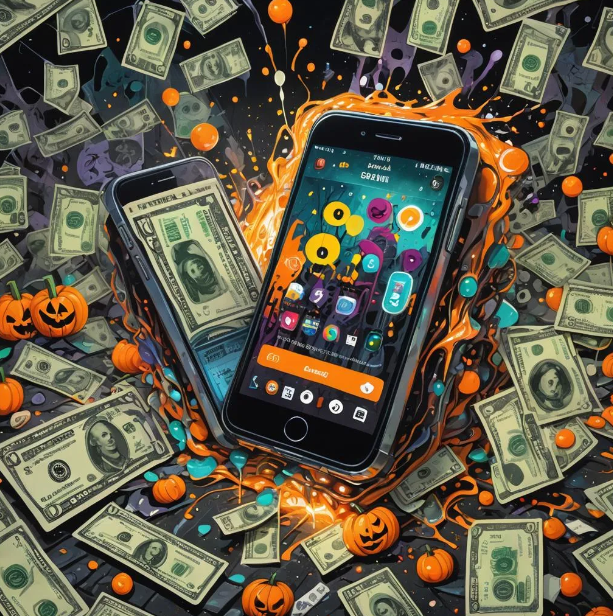Mark's phone glowed in the dark of Halloween night. His dating app match, Sophia, was texting again about the incredible investment opportunity.
"Just one more transfer," she wrote, "and we'll be set for life. Our dream home awaits."
Mark hesitated. He'd already invested his life savings, but Sophia's profile picture—those bewitching eyes—convinced him. He made the transfer.
His screen flickered, Sophia's profile transforming into a grotesque, grinning skull. "Thanks for playing," flashed across the screen.
Suddenly, his phone projected holograms all around his room—hundreds of faces, all with his hollow, desperate expression.
Mark is in for a HUGE surprise: Dating app investment fraud (read through to find out how this horror story ends).
This is a very real, and growing concern in the world of online romance scams.
Here's a detailed look at this deceptive practice:
Definition: Dating app investment fraud combines romance scams with financial fraud, where scammers use dating apps to lure victims into fake investment schemes.
How it works:
Scammer creates an attractive profile on dating apps
Builds trust and emotional connection with the victim
Gradually introduces talk of investments or financial opportunities
Persuades the victim to invest in a "lucrative" scheme
Common investment pitches:
Cryptocurrency trading
Forex markets
Real estate developments
Start-up companies
High-yield investment programs (HYIPs)
Tactics used:
Love bombing to quickly establish emotional bonds
Displaying apparent wealth to seem credible (luxury goods, travel photos)
Using urgency ("limited time offer") to prompt quick decisions
Promising unrealistically high returns
Showing fake investment platforms with growing balances
Red flags:
Reluctance to meet in person or video chat
Quick progression from romance to financial discussions
Pressure to keep the relationship or investments secret
Requests to move communication off the dating app
Claims of inside knowledge or guaranteed returns
Psychological manipulation:
Exploits victim's trust in a romantic partner
Plays on dreams of shared financial success
Uses victim's emotional investment to override skepticism
Platforms targeted:
Mainstream dating apps (Tinder, Bumble, etc.)
Niche dating sites catering to specific demographics
Social media platforms with dating features
Victim profile:
Often targets middle-aged or older individuals
May focus on those with higher incomes or savings
Can affect anyone regardless of education or financial literacy
Scale of the problem:
Millions lost annually to these scams
Often underreported due to embarrassment
Growing concern for dating app companies and financial regulators
Prevention strategies:
Thorough background checks on potential dates
Skepticism towards investment opportunities from romantic interests
Seeking independent financial advice before investing
Using reverse image searches to verify profile pictures
Recovery challenges:
Funds often transferred internationally, making recovery difficult
Cryptocurrency transactions are usually irreversible
Emotional trauma can compound financial loss
Emerging trends:
Use of AI to create more convincing fake profiles
Integration with legitimate-seeming investment apps or websites
Exploitation of current events (e.g., pandemic-related investment opportunities)
Dating app investment fraud is particularly insidious because it exploits both emotional vulnerability and financial aspirations. Awareness and education are key to helping potential victims recognize and avoid these scams.
A distorted voice boomed: "Welcome to the Investment Graveyard. You're all losers in the game of love and money."
As phantom hands reached for him, Mark realized he hadn't just lost his savings. He'd bet his soul on a rigged game.
In the dating app underworld, some matches are made in hell.
Let's help prevent this from happening:






No comments:
Post a Comment